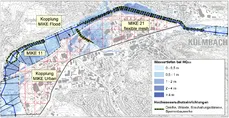Flood: Modelling and Decentralized Flood Management

Modern flood protection concepts are based on a cycle of flood risk management. They include – besides measures for follow-up care and damage prevention – both: technical flood protection measures as well as measures which consist of a natural and decentralized retention capability.
While technical flood protection measures can nowadays be assessed relatively clearly concerning their retention potential, there is a considerable need for research in order to provide reliable and generally valid statements about the effectiveness of natural and decentralized flood protection measures.
The answer to this question and the resulting development of effective integrated flood protection concepts is a focus of this research area.
Additionally, a special focus is set on the consideration of flood events of torrent catchment areas and the ability of flood forecast in the (pre-) alpine regions. The primary topography-based small-scale differences as well as the snow hydrological processes prevailed in these regions, represent a major challenge for the development of transparent and transferable model approaches of flood forecasting and the process-based simulation of (sub-) alpine basins. Through data collection in the Department's own study areas as well as the statistical analysis of the runoff in the alpine catchment areas, process based understanding and conceptual approaches in runoff modeling should be improved and further developed.
In urban hydrology, our focus is on the simulation of flash floods with coupled hydrological, hydrodynamic and sewer network modelling.